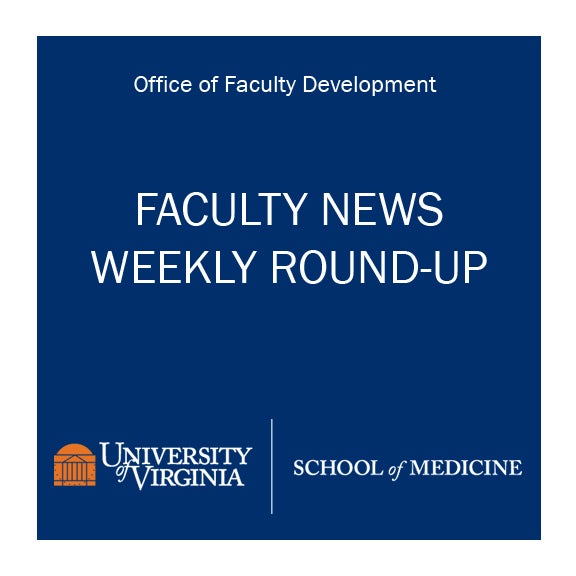 UVA SOM Faculty News Weekly Round-Up
UVA SOM Faculty News Weekly Round-UpApril 12, 2019
• Top Neuroscientists Meet at UVA Medical School
This weekend, UVA hosted the Central Virginia Chapter of the Society for Neuroscience’s 2019 Annual Conference. The conference was organized by Michael McConnell, PhD, Assistant Professor of Biochemistry and Molecular Genetics at UVA School of Medicine and President of the Central Virginia Chapter of the Society for Neuroscience.
Discoveries made by UVA researchers were among the topics discussed at the conference. “One of the real breakthroughs UVA has been on the front of is understanding how the nervous system and the immune system talk to each other. Several years ago, the Center for Brain Immunology and Glia started here at UVA and has brought together neuroscientists and immunologists that are really uncovering new things that we never knew about how the brain and the immune system talk to each other,” said McConnell.
Watch McConnell’s interview with CBS19: https://www.cbs19news.com/content/news/Top–Virginia-neuro-scientists-meet-at-UVA-Medical-School-508504011.html
• UVA Orthopedic Surgeon on Unproven Stem Cell Treatments
Dr. Mark Miller, S. Ward Casscells Professor of Orthopaedic Surgery and division head for Sports Medicine at UVA, wrote for the Daily Progress an opinion piece about stem cell treatments for conditions such as cartilage injuries: “I am a professor of orthopedic surgery at the University of Virginia. I am also a victim of knee osteoarthritis and went through knee replacements for both of my knees a little over a year ago. Since then I have made it my mission to educate the public about this condition, and to try to keep the enthusiasm regarding new cutting-edge options in check. That is because I have seen many patients who have paid thousands of dollars for a so-called stem cell treatment only to discover later that they were duped.”
Read more: https://news.virginia.edu/content/researcher-seeks-early-detection-forestall-glaucomas-ravages
• Researcher Seeks Early Detection to Forestall Glaucoma’s Ravages
Glaucoma is the leading cause of blindness in the U.S. and worldwide. More than 3 million Americans suffer from the eye disease. If caught and treated early, its progression can be significantly slowed, but the disease often goes undiagnosed until after noticeable vision loss has occurred – and that damage to vision is irreversible.
Glaucoma is often caused when abnormally high pressure inside the eye puts damaging pressure on the optic nerve. The optic nerve, which connects the eye with the brain, is made up of neuron cells, specifically retinal ganglion cells. Pressure causes retinal ganglion cells to die, never to be recovered. Vision loss sometimes begins around the periphery of the visual field and gradually moves toward the center, the line of sight. The disease may be inherited, but also may occur for reasons not yet understood.
Xiaorong Liu, a University of Virginia neuroscientist with appointments in the biology and psychology departments, is seeking to understand the processes that lead to retinal cell death.
“If we can understand exactly how and when cells die in the diseased condition, we can seek very early interventions that could stop cell loss early,” Liu said.
Read more: https://news.virginia.edu/content/researcher-seeks-early-detection-forestall-glaucomas-ravages
• Dissecting brains to find the biological answers to the mysteries of mental disorders
A recent Washington Post article highlighted the work of UVA School of Medicine researcher Michael McConnell, PhD.
From the Washington Post:
“Researchers are finding that certain genetic changes — deletions and duplications of DNA — may appear only in neurons in the brain, not in the rest of the cells in the body.
Michael McConnell, assistant professor of biochemistry and molecular genetics at the University of Virginia, is investigating what role these deletions and duplications of DNA, called copy number variants, play in neuropsychiatric disease. He has been studying brains in the Lieber collection to explore this mystery, pulling out single cells from brain tissue and profiling their DNA…
‘Maybe if we look at the brain we’ll find that [genetic variants are] not as rare as we think they are,’ McConnell says. If a certain variant is in a big enough chunk of the population, ‘it’s worth making a drug to try [to treat it].'”
Read the full article: https://www.washingtonpost.com/national/health-science/dissecting-brains-to-find-the-biological-answers-to-the-mysteries-of-mental-disorders/2019/04/05/4b99b9ec-4b20-11e9-93d0-64dbcf38ba41_story.html
• UVA Papers Among Most Downloaded from Journal of Immunology in 2018
The Journal of Immunology has released a list of 20 articles that were the most downloaded in 2018 – and two of them are by UVA researchers!
#10 is Cutting Edge: Critical Roles for Microbiota-Mediated Regulation of the Immune System in a Prenatal Immune Activation Model of Autism; Catherine R. Lammert, Elizabeth L. Frost, Ashley C. Bolte, Matt J. Paysour, Mariah E. Shaw, Calli E. Bellinger, Thaddeus K. Weigel, Eli R. Zunder and John R. Lukens
Read the article: http://www.jimmunol.org/content/201/3/845
#14 is Immune Cell Infiltration and Tertiary Lymphoid Structures as Determinants of Antitumor Immunity; Victor H. Engelhard, Anthony B. Rodriguez, Ileana S. Mauldin, Amber N. Woods, J. David Peske and Craig L. Slingluff Jr.
Read the article: http://www.jimmunol.org/content/200/2/432
View the full list of the top 20 Journal of Immunology articles downloaded in 2018: http://www.jimmunol.org/TopDownloads
—
Did we miss something? If you have UVA SOM faculty news to share, please email christa@virginia.edu.
Filed Under: Faculty News Weekly Round-Up, News

Comments